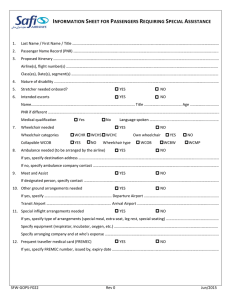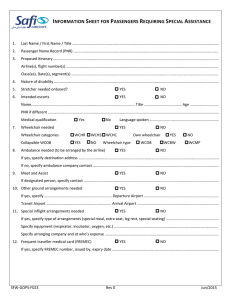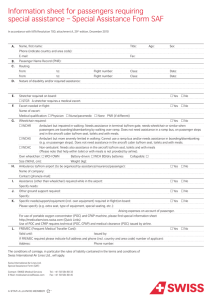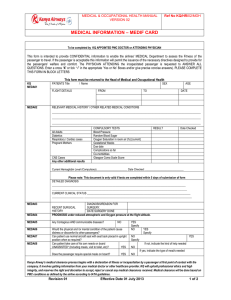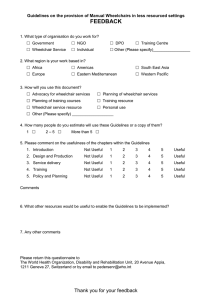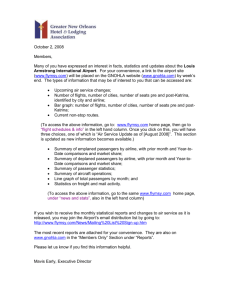Forms for Passengers Requiring Special
advertisement
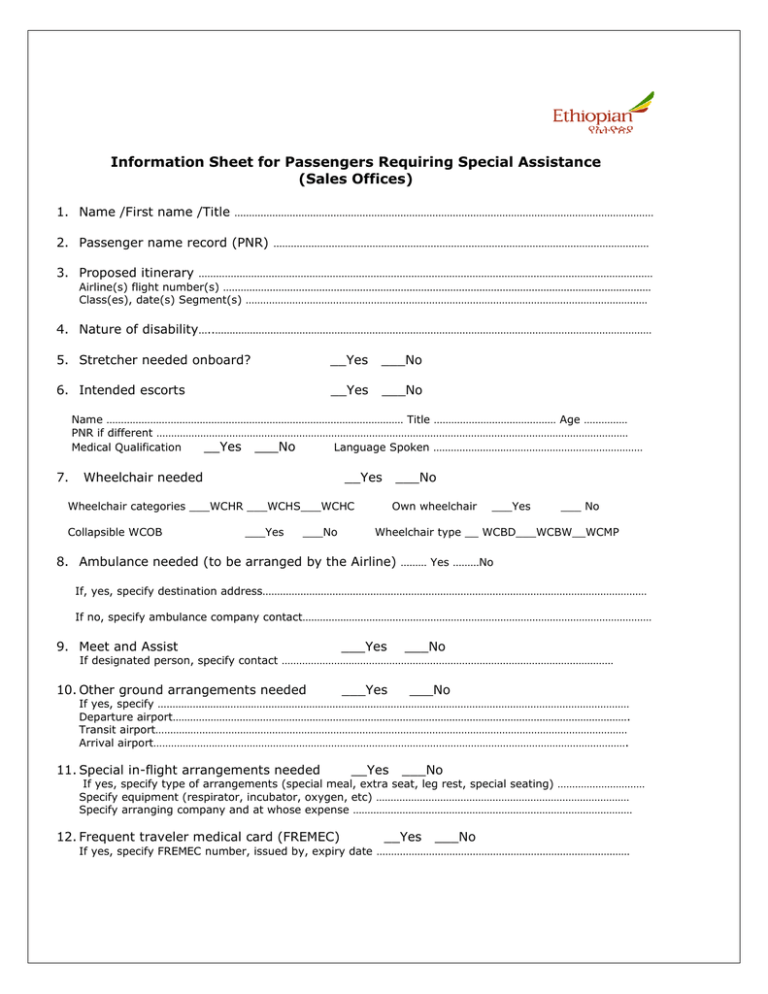
Information Sheet for Passengers Requiring Special Assistance (Sales Offices) 1. Name /First name /Title ……………………………………………………………………………………………………………………………… 2. Passenger name record (PNR) ………………………………………………………………………………………………………………… 3. Proposed itinerary ………………………………………………………………………………………………………………………………………… Airline(s) flight number(s) ………………………………………………………………………………………………………………………………… Class(es), date(s) Segment(s) ………………………………………………………………………………………………………………………… 4. Nature of disability…..…………………………………………………………………………………………………………………………………… 5. Stretcher needed onboard? __Yes ___No 6. Intended escorts __Yes ___No Name ………………………………………………………………………………………… Title …………………………………… Age …………… PNR if different ……………………………………………………………………………………………………………………………………………… Medical Qualification __Yes ___No Language Spoken ……………………………………………………………… 7. Wheelchair needed __Yes ___No Wheelchair categories ___WCHR ___WCHS___WCHC Collapsible WCOB ___Yes ___No Own wheelchair ___Yes ___ No Wheelchair type __ WCBD___WCBW__WCMP 8. Ambulance needed (to be arranged by the Airline) ……… Yes ………No If, yes, specify destination address…………………………………………………………………………………………………………………… If no, specify ambulance company contact………………………………………………………………………………………………………… 9. Meet and Assist ___Yes ___No If designated person, specify contact …………………………………………………………………………………………………… 10. Other ground arrangements needed ___Yes ___No If yes, specify ……………………………………………………………………………………………………………………………………………… Departure airport…………………………………………………………………………………………………………………………………………. Transit airport……………………………………………………………………………………………………………………………………………… Arrival airport………………………………………………………………………………………………………………………………………………. 11. Special in-flight arrangements needed __Yes ___No If yes, specify type of arrangements (special meal, extra seat, leg rest, special seating) ………………………… Specify equipment (respirator, incubator, oxygen, etc) …………………………………………………………………………… Specify arranging company and at whose expense …………………………………………………………………………………… 12. Frequent traveler medical card (FREMEC) __Yes ___No If yes, specify FREMEC number, issued by, expiry date …………………………………………………………………………… MEDICAL INFORMATION FORM (MEDIF) (to be completed or obtained from attending physician) (PART ONE) (See reverse side for guiding principles) 1. Patient’s name ……………………………………………………………………………………………………………………… Date of Birth …………………………… Sex ………………… Height ……………… Weight ………………………… 2. Attending physical E-mail ………………………………………………………………………………………………………………………………………… Telephone (mobile preferred), Indicate country and area Code ………………………… Fax …………………… 3. Diagnosis (including date of onset of current illness, episode or accident and treatment, specify if contagious) …………………………………………………………………………………………………………………………………… ………………………………………………………………………………………………………………………………………………………… Nature and date of any recent and/or relevant surgery ……………………………………………………………… 4. Current symptoms and severity ………………………………………………………………………………………… 5. Will a 25% to 30% reduction in the ambient partial pressure of oxygen (relative hypoxia) affect the passenger‘s medical condition? (Cabin pressure to be the equivalent of a fast trip to a mountain elevation of 2400 meters (8000 feet) above sea level) __Yes ___No ___Not sure 1. Cardiac Condition a. Angina Is the condition stable? Functional class of the patient? __ Yes __ No When was last episode? ………… __ Yes __ No __No symptoms __Angina with important efforts __ Angina with light efforts __ Angina at rest Can the patient walk 100 meters at the normal pace or climb 10-12 stairs without symptoms? ___Yes ___No b. Myocardial infraction __ Yes __ No Date ……………………………………… Complication? __ Yes __ No If, yes give details ……………………… Stress EKG done? __ Yes __ No If yes, what was the result …… Metz If angioplasty or coronary bypass, can the patient walk 100 meters at the normal pace or climb 10-12 stairs without symptoms? ___Yes ___No c. Cardiac failure __ Yes __ No When was last episode? ……… Is the patient controlled with medication? __ Yes __ No Functional class of the patient? ___No symptoms ___Shortness of breath with important efforts ___Shortness of breath with light efforts ___ shortness of breath at rest d. Syncope __ Yes __ No Last episode? ……………………………… Investigation? __ Yes __ No If yes, state results…………………… __ Yes __ No a. Has the patient had recent arterial gasses? __ Yes __ No b. Blood gases were taken on: ____Room air _____Oxygen ____LPM If yes, what were the results _____pCO2 ____ pO2 Saturation ……………………………………………………… Date of exam ………………………………………………… c. Does the patient retain CO2? __ Yes __ No d. Has his/her condition deteriorated recently? __ Yes __ No e. Can the patient walk 100 meters at a normal pace or climb 10-12 stairs __ Yes __ No without symptoms? f. Has the patient ever taken a commercial aircraft in these conditions? __ Yes __ No If yes when? ………………………………………………………………………………………………………………………… Did the patient have any problems? ……………………………………………………………………………… 2. Chronic pulmonary condition 6. Additional clinical information a. Anemia b. c. d. e. f. g. h. MEDICAL INFORMATION FORM (MEDIF) (to be completed or obtained from attending physician) (PART TWO) ___ Yes ___ No If yes, give recent result in grams of hemoglobin ………… Psychiatric and seizure disorder ___ Yes ___ No If yes, see Part 2 Cardiac condition ___ Yes ___ No If yes, see Part 2 Normal bladder control ___ Yes ___ No If no, give mode of control ………… Normal bowel control ___ Yes ___ No Respiratory condition ___ Yes ___ No If yes, see Part 2 Does the patient use oxygen at home? ___Yes ___ No If yes, specify how much …………… Oxygen needed in the flight? ___ Yes ___ No If yes, specify ___ 2LPM ___4LPM ___Others __ Yes __ No a. Is there a possibility that the patient will become agitated during flight? __ Yes __ No b. Has he/she taken a commercial aircraft before? __ Yes __ No . If yes, date of travel? …………………………… Did the patient travel ___alone ____escorted? 3. Psychiatric Conditions 7. Escort a. Is the patient fit to travel unaccompanied? b. If no, would a meet-and- assist (provided by the airline to embark and disembark) be sufficient? c. If, no will the patient have a private escort to take care of his/her needs on board? d. If yes, who should escort the passenger? ____ Doctor ____ Nurse e. If other, is the escort fully capable to attend to all the above needs? ___ Yes ___ No ___ Yes ___ No ___ Yes ___ No ____ Other ___ Yes ___ No __ Yes __ No a. What type of seizures? ……………………………………………………………………………………………………………… b. Frequency of seizures ………………………………………………………………………………………………………………… c. When was the last seizure? ………………………………………………………………………………………………………… d. Are the seizures controlled by medication? __ Yes __ No 4. Seizure 5. Prognosis for the trip 8. Mobility a. Able to walk without assistance ___Yes ___No b. Wheelchair required for boarding ___to aircraft ___to seat ___ Good ____ Poor Physician Signature _________________ Date ________________ 9. Medication list ………………………………………………………………………………………………………………………… Note: Cabin attendants are not authorized to give special assistance (e.g. lifting) to particular passengers, to the detriment of their service to other passengers. Additionally, they are trained only in first aid and are not permitted to administer any injection, or give medication. 10. Other medical information Important: Fees, if any, relevant to the provision of the above information and for carrier- provided special equipment are to be paid by the passenger concerned. ………………………………………………………………………………………………… 1 2 PRINCIPLES FOR THE GUIDANCE OF THE PHYSICIAN There are certain guiding principles in deciding whether or not a person is physically and emotionally fit to travel by air. Although each case will be considered on its own merit by the carrying airline, the following conditions are generally considered. UNACCEPTABLE for air travel: a. Very Severe and critical heart conditions, such as: the severally de-compensate cardiac- patient or the patient who has sustained a recent coronary occlusion with my coca dial infraction. Such cases are not normally eligible within six weeks of the onset and are at discretion of the carrier. b. Those patients with entrapped gas, such as a recent pneumothoratx, or one who has had air introduced into the nervous system recently for ventirculography. c. Psychotic patient requiring heavy sedation or restraint unless attended and special arrangements made. Some carriers will not accept psychotic passengers under any circumstances. d. Severe cases or otitis media with blockage of the Eustachian tube. e. Acute contagious or communicable disease. f. Pregnancy beyond the thirty-second week (on short flights, pregnancy up to the thirty sixth week is acceptable by some carriers.) g. Persons with contagious or repulsive skin conditions. h. Recent cases(less than 2 weeks) of hemorrhagic cerebro-vascular accidents, passengers with altered level of consciousness at any time unless special arrangements are made with the carrier. i. Persons with large mediastinal tumors, extremely large unsupported hernias, intestinal obstruction, cardnial diseases involving increased pressure, fracture of the skull and those with recent fracture of the mandible with permanent wiring f the jaw. j. Recent surgical cases with insufficient time for wound healing.
